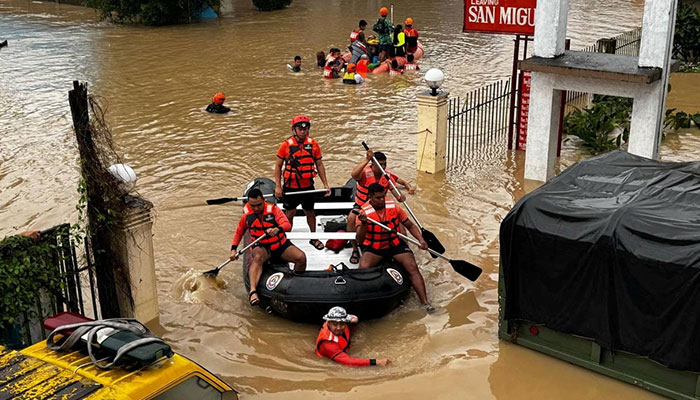Tropical storm leaves towns submerged, 76 dead in Philippines
Thousands displaced by floods fueled by two months' worth of torrential rain just in two days time
October 25, 2024

PHILIPPINES: Homeowners in the northern Philippines used spades and rakes to clear out debris left by Tropical Storm Trami on Friday while rescuers trawled through thick mud looking for the missing as the death toll rose to 76.
Tens of thousands of people were displaced by floods fueled by a torrential downpour that dumped two months' worth of rain over just two days in some areas.
"Many are still trapped on the roofs of their homes and asking for help," Andre Dizon, police director for the hard-hit Bicol region, told AFP.
"We are hoping that the floods will subside today since the rain has stopped," he added.
But accessibility remained a major issue for rescuers Friday, particularly in Bicol, President Ferdinand Marcos said.
"That's the problem we're having with Bicol, so difficult to penetrate," he said, adding that the heavily saturated ground led to "landslides in areas that didn't have landslides before."
Two months worth of rain
Government offices and schools across the main island of Luzon remained shuttered Friday, but storm surge warnings were cancelled along the west coast as Trami flew farther out to sea.
State weather agency specialist Jofren Habaluyas told AFP that Batangas province had seen "two months' worth of rain", or 391.3mm, fall over October 24 and 25.
An official tally late Thursday reported nearly 320,000 people evacuated in the face of flooding that turned streets into rivers and half-buried some towns in sludge-like volcanic sediment set loose by the storm.
Rescuers in Naga city and Nabua municipality used boats to reach residents stranded on rooftops, many of whom sought assistance via Facebook posts.
The search for a missing fisherman whose boat sunk in the waters off Bulacan province west of Manila, meanwhile, remained suspended Friday due to strong currents, the local disaster office said.
About 20 big storms and typhoons hit the Philippines or its surrounding waters each year, damaging homes and infrastructure and killing dozens of people.
A recent study showed that storms in the Asia-Pacific region are increasingly forming closer to coastlines, intensifying more rapidly and lasting longer over land due to climate change.











